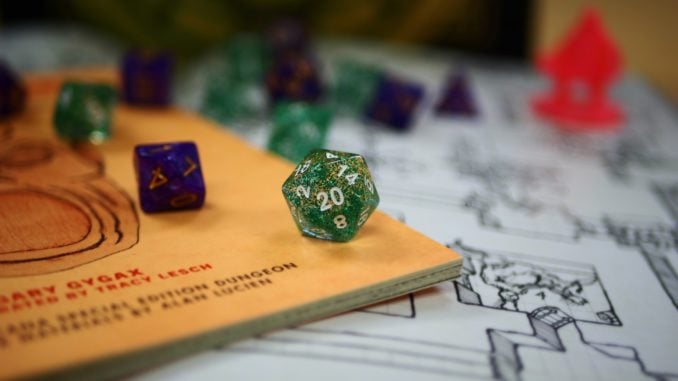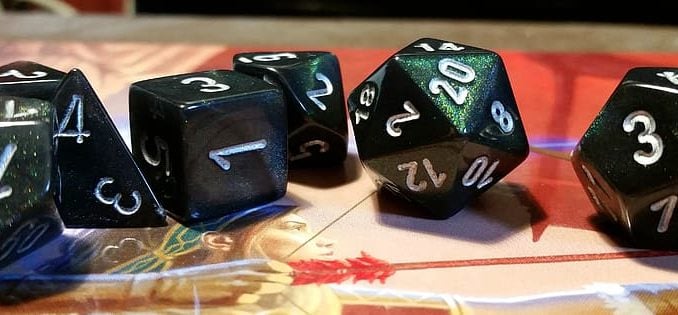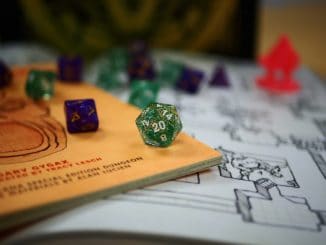
Spellcasting is one of the best parts of Dungeons and Dragons. Sure, developing a character or hacking your way through a quest is great. But there is something about magic that is, well, magical. There are drawbacks with lots of spells, of course. Dealing with spell slot limitations is one of the most prominent. That is where ritual spellcasting comes into play in 5E. Instead of using a spell slot, ritual spells only require time. In this Ritual Spells 5E Guide, we cover every aspect of ritual magic.
Table of Contents
The Complete 5E Ritual Spells Guide
According to the Player’s Handbook, Ritual Spells are:
Certain spells have a special tag: ritual. Such a spell can be cast following the normal rules for spellcasting, or the spell can be cast as a ritual. The ritual version of a spell takes 10 minutes longer to cast than normal. It also doesn’t expend a spell slot, which means the ritual version of a spell can’t be cast at a higher level.
In other words, ritual spells can be cast just like any other. However, they also include an additional option for casting that most spells don’t have. Ritual spells may be cast even if they are not taking up a spell slot.
Limits on Ritual Spells in 5E
The possibilities are not endless for every character. Normal spell casting rules apply, which means classes like clerics must prepare a ritual spell to cast it that day. For classes like bards that have all of their spells they know prepared. A ritual spell can get you around the necessary spell slot, but it does not eliminate the other requirements under the rules. Consider these important limitations on 5e ritual spells:
- Knowing a ritual spell does not guarantee you can cast it at any given time. For starters, you must play a character that has the ability to use rituals. This is easier for some classes than others. For example, rangers and warlocks have ritual spells available to them but lack the ability to cast them. Thankfully, there are ways to gain that ability.
- You must maintain concentration for the duration of the spell. Losing concentration means you have to start the spell over. Naturally, you cannot cast another spell during this time as it would break your concentration on the ritual.
- The major advantage of a ritual is that you can use them without a spell slot, but they also place limitations on how you can cast them. You may not cast a ritual spell using a higher level slot, for example.
- Ritual spells are not exempt from component requirements. If you lack the required components, you may not cast a ritual spell.
Casting these spells does have some flexibility. You can concentrate on the spell while moving, which means your party does not have to sit patiently while you cast. This can come in handy in a variety of situations. That said, casting a ritual will use up every turn you have while concentrating on the spell.
The Ability to Cast Ritual Spells 5E
Not every character will have the opportunity to use ritual magic. Some classes offer the ability to use rituals inherently, while others can obtain a feat that allows it. The three ways a character obtains the ability to cast rituals include:
- As a feature of the class
- Through Ritual Caster feat
- As a special class feature
Classes That Can Use Rituals Inherently
The most common way for a character to gain access to rituals is by being part of a class that allows rituals as part of their class features. These classes include bards, druids, clerics, and wizards. Wizards have more options than the other classes, as they can cast rituals from books. (discussed further below)
By multiclassing, you could gain the ability to cast ritual spells. There are important limitations on this which prevents balance issues. If you multiclass into a class that allows rituals, you are limited to ritual spells of that class. You cannot pick up a level in a class that allows rituals and then cast ritual spells from other classes. For example, if you are a ranger and you multiclass into a wizard, you could cast wizard rituals as the rules allow. However, you could not cast a ranger spell as a ritual, even if you know it.
The Ritual Caster Feat
The most common way for a character to obtain the use of ritual spells is through the Ritual Caster feat. This method is the easiest way to obtain access to these spells in most cases, as well. The prerequisite for this feat is Intelligence or Wisdom 13. According to the player’s handbook:
You have learned a number of spells you can cast as rituals. These spells are written in a ritual book, which you must have on hand when casting one of them. When you gain this feat, choose one of the following classes: bard, cleric, druid, sorcerer, warlock, or wizard. You acquire a ritual book holding two 1st level spells with the ritual tag, which must be on the list of the chosen class. Your casting ability for these rituals are the same as the chosen class (Charisma for bard, sorcerer, or warlock; Wisdom for cleric or druid; Intelligence for wizard).
This feat allows you to cast ritual spells from a book without using a spell slot. You can only cast these spells if the ritual is in your spellbook, however. This is true even if you could cast the spell in other ways. The feat requires either intelligence or wisdom 13. As long as you have one or the other you are good to go. If both of these are your dump stats you could be better off multiclassing into a class that naturally allows rituals. If possible, the feat is a better option.
Once you obtain the feat, you must select a class. The class you select determines the ritual magic you have access to. You can choose spells from that class list, but you also use the spellcasting ability from that class each time you cast a spell. This is not that important with rituals since they rarely result in save throw against the spell. Because of that, the most important criterion is selecting the class with the spells you prefer. Ranger makes the most sense for obtaining this feat out of all the classes, given that Wisdom is their ability tied to spellcasting. This feat makes little sense for classes that already get rituals or are unlikely to meet the ability requirements.
See Also: How Much Starting Gold do I get in D&D 5E?
Rituals as Class Features
Some classes and subclasses offer specialized access to rituals. While these options are often powerful, they are also the least common way to gain access to ritual spells. This includes rituals used by barbarians. The most powerful example is the Pact of the Tome warlock’s feature, Book of Ancient Secrets. The player’s handbook says this about the feature:
You can now inscribe magical rituals in your Book of Shadows. Choose two 1st-level spells that have the ritual tag from any class’s spell list. The spells appear in the book and don’t count against the number of spells you know. With your Book of Shadows in hand, you can cast the chosen spells as rituals. You can’t cast the spells except as rituals unless you’ve learned them by some other means. You can also cast a warlock spell you know as a ritual if it has the ritual tag.
In other words, this feature operates much like the Ritual Caster feat. There is one important difference, though, and it is a big one. Using the Book of Ancient Secrets, you can learn any ritual spell regardless of class. Gaining this feature can be time-consuming, but once you have it the cost of learning a spell is no different than with Ritual Caster.

Ways to Obtain a 5E Ritual Spell
You can copy a ritual spell into a ritual book much copying a spell into a wizard spellbook. If you come across a scroll with a ritual spell, you may attempt to copy it into your book. This attempt will destroy the scroll no matter what. The Player’s Handbook describes the process of obtaining a spell as follows:
If you come across a spell in written form, such as a magical spell scroll or a wizard’s spellbook, you might be able to add it to your ritual book. The spell must be on the spell list for the class you chose, the spell’s level can be no higher than half your level (rounded up), and it must have the ritual tag. The process of copying the spell into your ritual books takes 2 hours per level of the spells and costs 50 gp per level of the spell. This cost represents material components spent on practicing the spell, as well as the fine inks you must use to record it.
To successfully copy the spell from a scroll, you must spend 50g on the ink necessary to attempt copying the spell. The Handbook is not clear on how that should work. After all, what if you are in a cave somewhere and find a scroll? While the Handbook implies that if you copy the spell then 50 gold disappears into the ether. It is best for the DM to set a house room regarding this issue. Many require characters to purchase scroll copying “kits” for 50g and carry them to use for copying.
Finally, the book is clear that copying a spell from one spellbook to another is possible. While the rules don’t specify whether this act consumes the original spellbook, most players assume it does not.
5E Ritual Spells List
Below, we break down the ritual spells available to each class. Unsurprisingly, some classes are the clear winner in this regard. Others have very weak ritual offerings.
Bard Ritual Spells
Bards were in a weird place before 5E, but have since really come into their own. One interesting way to build a powerful bard character is through the use of ritual magic. This is due to the spellcasting rules that apply to the class. Bards are always prepared to use a spell they know, no matter how many there are. This is a huge advantage when it comes to casting rituals. This means a bard is always prepared to cast every ritual spell they know. The full list of bard ritual spells ar below. We have also helpfully ranked the Best Bard Cantrips in 5E; be sure to check it out.
1st level
- Comprehend languages
- Detect magic
- Identify
- Illusory script
- Speak with animals
- Unseen servant
2nd Level
- Animal messenger
- Locate animals or plants
- Magic Mouth
- Silence
- Skywrite
3rd Level
- Feign death
- Leomund’s tiny hut
There are several Bard ritual spells that are situational. While they may not be worth using up a spell slot for, they could come in handy as a ritual. Spells like Comprehend Languages or Detect Magic are great examples of this. The same goes with Speak with Animals – unless you are certain your quest might require this, Speak with Animals seems like a wasted spell slot. Always having that in your back pocket as ritual sounds pretty great, though. Other spells like silence or feign death are not as useful.
Cleric Ritual Spells
Clerics have a lot of options when it comes to ritual spells. While Bard rituals only go up to level 3, Clerics have options up to level 6. Clerics can inherently use rituals, which makes them a natural fit for many character builds. The bad news is that you can only cast rituals that you have prepared, meaning there are some important choices to make.
1st Level
- Ceremony
- Detect magic
- Detect poison and disease
- Identify. Only if you are Knowledge domain
- Purify food and drink
- Speak with animals
2nd Level
- Augury
- Gentle repose
- Silence
3rd Level
- Feign death
- Meld into stone
- Water walk
4th Level
- Divination
5th Level
- Commune
6th Level
- Forbiddance
Identify is situational but strong. It allows you to identify magic items in a pinch, and importantly is always prepared since it is a domain spell. Precognitive spells like Divination and Commune are also not a bad option; you never know when you might need a Q&A session with your favorite deity. Forbiddance is also very powerful, but very situational. Few spells are as situational as Ceremony, though. That said, if you have the costly ruby dust needed to cast it using the spell as a ritual makes sense.

Druid Ritual Spells
Druids also have a strong list of ritual spells available, including many that other classes do not have access to. Like with clerics, only prepared ritual spells are available to a druid. This is not the case if you are accessing druid ritual spells using the ritual caster feat.
1st Level
- Detect magic
- Detect poison and disease
- Purify food and drink
- Speak with animals
2nd Level
- Animal messenger
- Beast sense
- Locate animals or plants
- Skywrite
3rd Level
- Feign death
- Meld into stone
- Water breathing
- Water walk
4th Level
- Divination
5th Level
- Commune with nature
While druid ritual spells can be useful, they are very situational. Many of these spells are especially useful in forrests or natural settings. These same spells are less useful during dungeon crawls. For example, Commune with nature can be incredibly beneficial for exploration-based games set in the wilderness. However, it specifically does not work in dungeons. The value of these spells depends not only on your character but on the type of game you intend to play.
Paladin Ritual Spells
As our Paladin 5E Guide lays out, paladins have a limited number of ritual spells. This makes sense given that Paladins cannot ritual cast on their own.
1st Level
- Ceremony
- Detect magic
Sorcerer Ritual Spells
The ritual spells for sorcerer are notoriously weak. It is also a major waste to select these spells after obtaining the Ritual Caster feat.
1st Level
- Comprehend Languages
- Detect Magic
3rd Level
- Water Breathing
- Water Walk
Wizard Ritual Spells
Ultimately, wizards are the kings of rituals in a lot of ways. They do not have to prepare a ritual spell if it is in their spellbook, giving them access to a wide range of spells without the need for preparing them. Meanwhile, the number of spells available is significant, too. Not only do wizards have the most ritual spells, they have some of the most powerful as well.
1st Level
- Alarm
- Comprehend languages
- Detect magic
- Find familiar
- Identify
- Illusory script.
- Tenser’s floating disk
- Unseen servant
2nd Level
- Gentle repose
- Magic Mouth
- skywrite
3rd Level
- Feign death
- Leomund’s tiny hut
- Phantom Steed
- Water breathing
5th Level
- Contact other planes
- Rary’s telepathic bond
6th Level
- Drawmij’s instant summons
There are some great options for ritual casting wizards. These options occur at both low and high spell levels. For instance, a 1st Level spell like alarm can be handy any time you set up camp. Spells like Identify are also great in many instances. In short, these spells are a lot of fun. In fact, I am fond of Leomund’s Tiny Hut which makes camping simple.
Artificer Ritual Spells
The newest class – Artificers – comes to us by way of the fantastic resource Eberron: Rising from the Last War. The engineers of the magical world, artificers have some spellcasting ability of their own. Like with the cleric as well as the druid, they know all of the spells on their list and do not need to prepare them.
1st Level
- Detect magic
- Identify
- Alarm
2nd Level
- Skywrite
- Magic Mouth
3rd Level
- Water Walk
- Water Breathing
Conclusion
Ritual magic is the type of interesting wrinkle that Dungeons and Dragons keep coming back for. In fact, these spells are one of my favorite parts of the game. Whether casting spells naturally or picking them up with the Ritual Casting trait, there are lots of options in front of you. Above all, I hope this guide is a helpful resource to you. However, if we missed anything let us know in the comment section.




Under Wizard Rituals, you have written, “For instance, a 1st Level spell like alarm can be handy any time you set up camp. On the other hand, higher-level spells like Identify are also great in many instances.” Might wanna fix that.
Otherwise, thank you for providing lists for each classes ritual spells. Really helped me decide which one to go with for my own Ritual Casting.
Thanks, fixed that.
Under wizards rituals, you have magic mouth as a 1st level, but its a second level like you have it for artificer.
Great list, thank you for putting this out there!
Thank you, corrected that one.
Skywrite and ceremony are both ritual spells from Xanathar’s guide.